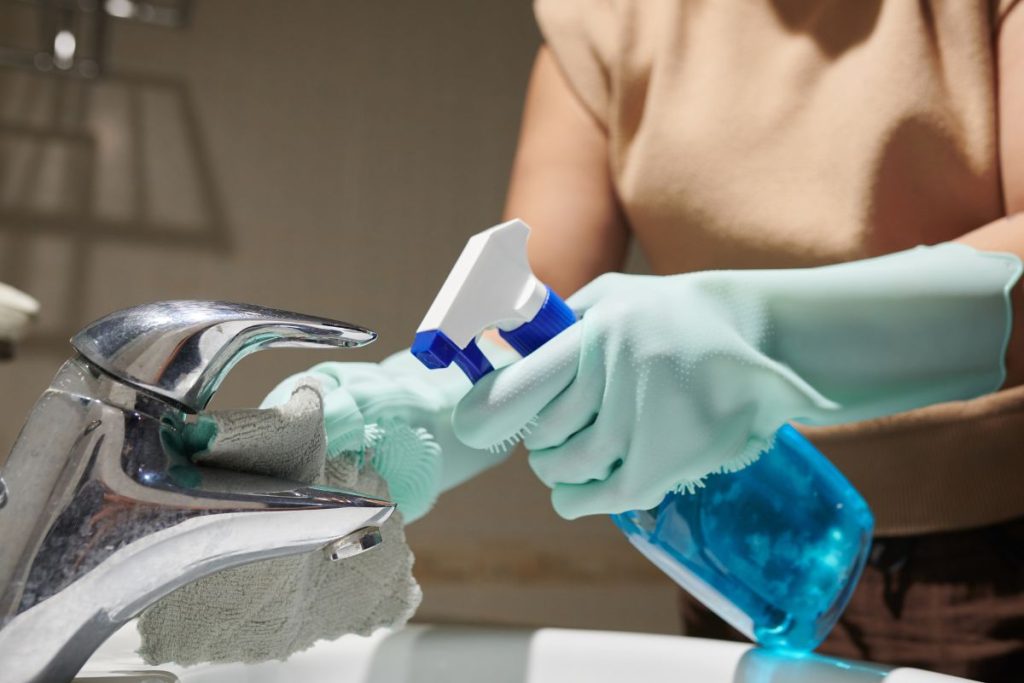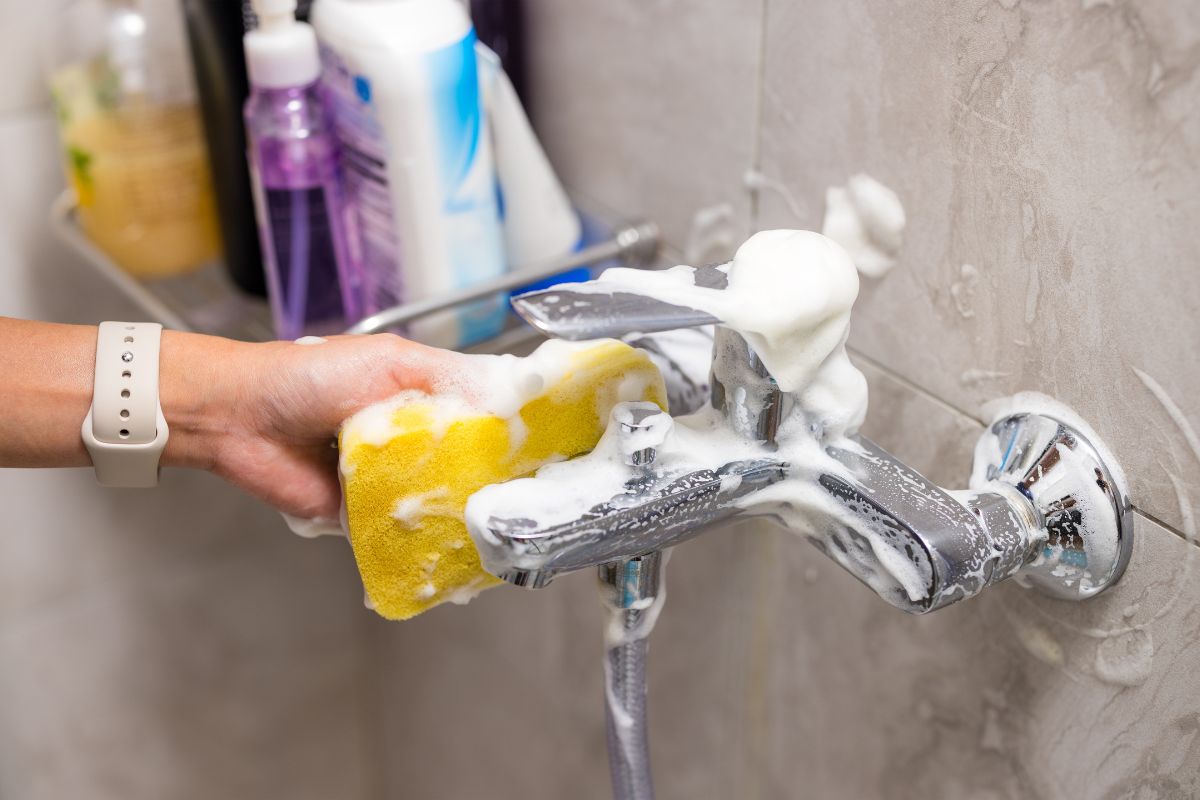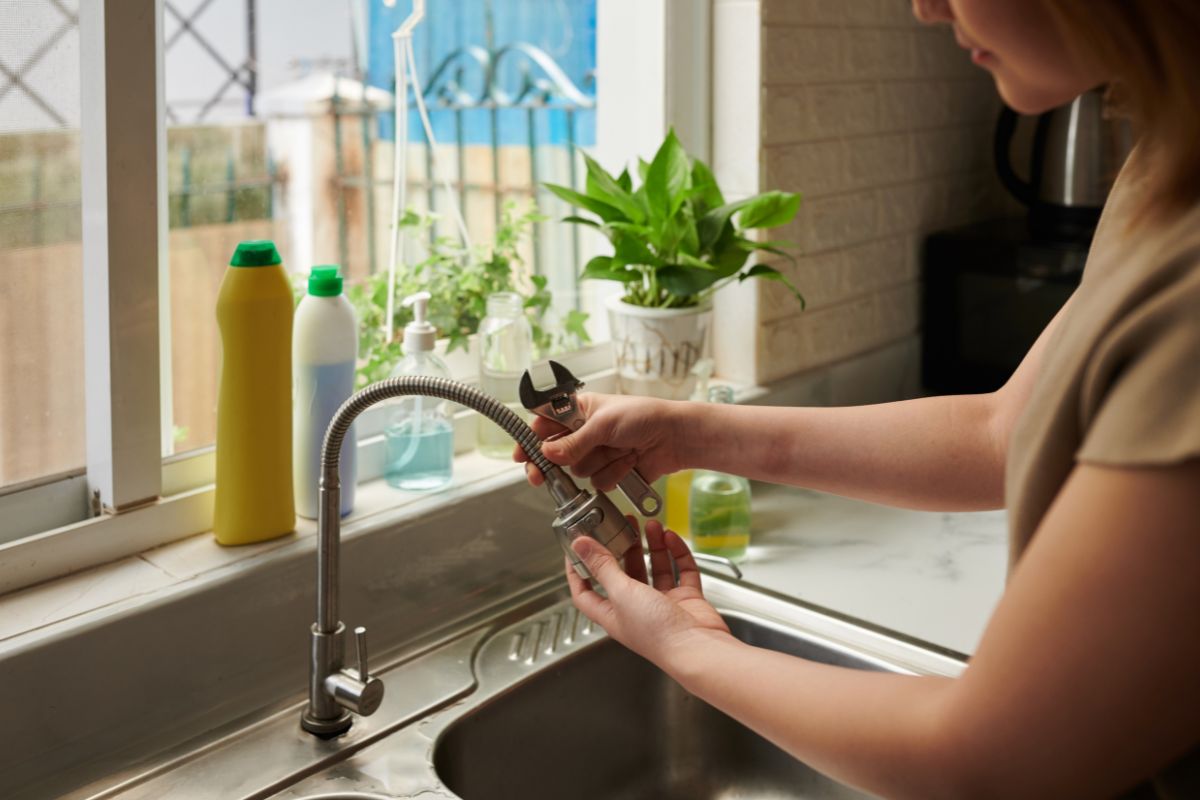
Are you battling unsightly hard water stains on your faucets, shower doors, and glassware? You’re not alone! Hard water, rich in minerals like calcium and magnesium, leaves behind stubborn deposits that can be a real eyesore. But don’t despair!
The Pesky Problem of Hard Water Stains
Hard water stains are mineral deposits left behind when hard water evaporates. The white, chalky residue you often see is primarily calcium and magnesium carbonates. These deposits, often called limescale, cling to surfaces, making them difficult to remove with ordinary cleaning methods. They’re more than just an aesthetic issue; they can also reduce the efficiency of appliances and plumbing fixtures over time.
Why are Hard Water Stains So Difficult to Remove? The minerals in hard water bond strongly to surfaces, creating a tough, alkaline residue. Simply wiping them away won’t work; you need to dissolve or break down these mineral deposits.
Where Do Hard Water Stains Typically Appear in My Home? Common problem areas include:
- Bathroom fixtures: Faucets, showerheads, shower doors, and tiles.
- Kitchen sinks and faucets: Especially around the drain and spout.
- Toilets: Inside the bowl and around the water line.
- Dishes and glassware: Leaving cloudy spots and film.
This comprehensive guide provides proven DIY methods and expert tips to effectively remove these stains and prevent their return, restoring the sparkling clean look to your home.
DIY Hard Water Stain Removal Methods

Fortunately, many effective DIY solutions can tackle hard water stains using readily available household ingredients.
Using Vinegar: Vinegar, specifically white vinegar, is a mild acid that effectively dissolves mineral deposits.
- Instructions: Soak paper towels in vinegar and apply them to the stained area. Let it sit for 30-60 minutes, then scrub with a non-abrasive sponge or brush. Rinse thoroughly with water.
- Safety Precautions: Always test vinegar on an inconspicuous area first to ensure it doesn’t damage the surface. Avoid using vinegar on natural stone surfaces like marble or granite.
- Baking Soda Paste: Baking soda is a gentle abrasive that can help scrub away stubborn stains.
- Instructions: Mix baking soda with a small amount of water to form a paste. Apply the paste to the stained area, let it sit for a few minutes, then scrub gently. Rinse thoroughly.
- Safety Precautions: Avoid using excessive pressure when scrubbing, as baking soda can scratch delicate surfaces.
Targeting Specific Areas
Different areas of your home require slightly different approaches to hard water stain removal.
Bathroom Fixtures:
- For faucets and showerheads, try soaking them in a bag filled with vinegar. Secure the bag with a rubber band and let it sit overnight.
- For shower doors and tiles, use a spray bottle filled with vinegar and water solution. Spray the area, let it sit for a few minutes, then scrub and rinse.
Kitchen Sinks and Faucets:
- A baking soda paste works well for cleaning stainless steel sinks.
- For faucets with intricate designs, use an old toothbrush to reach hard-to-clean areas.
Toilets:
- Pour a cup of vinegar into the toilet bowl and let it sit overnight. Scrub with a toilet brush in the morning and flush.
- For stubborn stains, you can use a pumice stone (use with caution to avoid scratching).
Dishes and Glassware:
- Add vinegar to your dishwasher’s rinse aid dispenser to help prevent hard water spots.
- Soak glassware in a vinegar and water solution before washing to remove existing stains.
If you have any questions or need expert tips on hard water stain removal, feel free to reach out! Contact us today and let us help you reclaim your shine.
Advanced Techniques for Stubborn Stains

Sometimes, DIY methods aren’t enough to remove particularly stubborn hard water stains. In these cases, you may need to resort to more advanced techniques.
Using a Pumice Stone: A pumice stone can be effective for removing thick mineral deposits, but use it with extreme caution to avoid scratching surfaces. Wet the stone and the surface before scrubbing gently.
Using Commercial Cleaners: Many commercial cleaners are specifically formulated to remove hard water stains. Look for products containing ingredients like citric acid or sulfamic acid. Always follow the manufacturer’s instructions and safety precautions.
Preventing Future Hard Water Stains
Prevention is always better than cure! Here are some tips to minimize the formation of hard water stains:
Using a Water Softener: A water softener removes minerals from your water, preventing hard water stains from forming in the first place. This is the most effective long-term solution, but the costs for water softener installation could be quite a bit.
Wiping Down Surfaces After Use: Wiping down surfaces after each use prevents water from evaporating and leaving behind mineral deposits.
Regular Cleaning Schedule: A regular cleaning schedule will help prevent hard water stains from building up to problematic levels.
Preventative Products: There are also many protective products on the market that can help prevent hard water stains. Check out for hard water stain prevention products.
DIY vs. Professional: When to Call a Pro
Knowing when to tackle hard water stains yourself and when to call a professional is essential. Consider the following:
- Severity of the Stains: If the stains are minor and you’re comfortable with DIY methods, you can likely handle them yourself.
- Time Savings: Professional cleaners can save you time and effort, especially if you have a large area to clean.
- Risk Assessment: If you’re concerned about damaging surfaces or using harsh chemicals, it’s best to call a professional.
Need help tackling stubborn hard water stains? Call us today for expert advice and reclaim your shine!
Sparkling Clean, Hard Water Free!
Hard water stains can be a frustrating problem, but with the right knowledge and techniques, you can effectively remove them and prevent their return. By following the tips and methods outlined in this guide, you can reclaim the shine of your home and enjoy a sparkling clean environment. And remember, if you’re ever feeling overwhelmed, our professional team is just a phone call away, ready to restore the beauty of your home!
Frequently Asked Questions (FAQs)
What is the best way to remove hard water stains from glass?
Vinegar is generally effective. Soak a cloth or paper towel in vinegar and apply it to the glass for 30-60 minutes, then scrub and rinse. For stubborn stains, try using a specialized glass cleaner designed for hard water.
Is vinegar safe to use on all surfaces?
No, vinegar is acidic and can damage certain surfaces, such as natural stone (marble, granite), some metals, and waxed furniture. Always test in an inconspicuous area first.
How often should I clean to prevent hard water stains?
The frequency depends on the hardness of your water and how often surfaces are exposed to water. Wiping down surfaces after each use is ideal, but a weekly cleaning routine is generally sufficient to prevent significant buildup.
Are hard water stains harmful to my health?
No, hard water stains themselves are not harmful to your health. The minerals in hard water are generally safe to consume. However, the buildup of hard water stains can affect the efficiency of appliances and plumbing fixtures.
How does a water softener prevent stains?
A water softener removes calcium and magnesium minerals from your water, preventing them from forming the deposits that cause hard water stains.
Struggling with hard water stains? Give us a call today and let us help you restore the shine!

